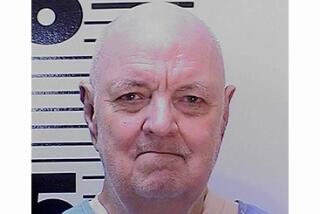In 2nd Trial, Verdict Once Again Guilty in Slayings
For almost two decades, former death row inmate Kenneth Crandell persistently--and nearly successfully--appealed his way to freedom.
His death sentence became a life term. He was eventually granted a new trial. Through the years, witnesses died and evidence against him was lost.
But on Monday, Crandell was found guilty once again of the first-degree murders of Ernest and Edward Pruett, the North Hollywood father and son who were each shot in the head in their home in 1980. Crandell was also convicted of assaulting and kidnapping Ernest Pruett’s daughter, Marie, who was 15 years old at the time.
As the now 66-year-old Crandell, who became sick with an undisclosed ailment this past weekend, was led away from the courtroom in a wheelchair on Monday, the surviving members of the Pruett family said they hoped that this time, the man they once considered a family friend would be put away for good.
“I’m thrilled with the verdict,” said Marie Pruett Tyler, now a 34-year-old mother of three who lives on the East Coast. “I can sleep a little sounder now. My father and brother can rest in peace, finally.”
Because the crime occurred so long ago, the case presented the prosecution with formidable challenges. Not only had a key witness--a coroner’s investigator who performed a critical crime-scene test--died, all of the physical evidence was inadvertently destroyed by a court clerk in the mid-1990s.
Absent from this trial were the murder weapon, blood samples and other physical evidence found at the scene of the crime. Witnesses still living had to recall events that occurred two decades ago.
Crandell was a boarder living with 69-year-old Ernest Pruett, a financially-struggling widower, and his three children. Last week, Crandell testified that he shot Pruett in self-defense after Pruett, during a drunken rage, shot and killed 14-year-old Edward. Crandell was represented by attorney Michael V. White.
The jury of seven women and five men, who deliberated about a day and a half, didn’t buy Crandell’s story. “It was pretty clear-cut,” said juror Rich Robles of Van Nuys.
Witnesses in the trial testified that Pruett loved his children and would never have physically harmed Edward. Deputy Dist. Atty. Lea Purwin D’Agostino argued that no gunshot residue was found on Pruett’s hands, indicating that he never held the murder weapon.
“The gunshot-residue test was very important,” said juror Maryann Lapointe of West Hills. “At that point we decided that the father did not kill the son.”
Other witnesses testified that both father and son were shot with a pillow held to the gun, a deliberate attempt to silence the weapon that made the drunken rage and self-defense scenarios unlikely.
Because there are special-circumstances allegations of multiple murders, Crandell faces a life sentence without the possibility of parole, D’Agostino said.
While the verdict was read, Crandell--who wore a hospital gown and had a needle taped to his arm--folded his hands and looked down.
Afterward, Los Angeles County Superior Court Judge Sandy R. Kriegler explained to jurors the case history.
During Crandell’s first trial in 1982 he represented himself.
According to court documents, Armand Arabian, the presiding judge at the time, who later served on the state Supreme Court, said, “Mr. Crandell did a job which absolutely astounded me.”
The state Supreme Court reversed his death sentence in 1988, and prosecutors agreed that Crandell would serve a life sentence without the possibility of parole.
In 1996, a federal court found that the deputy public defender who originally represented Crandell was incompetent because he failed to communicate with his client for two months. Crandell asked the trial court to appoint alternative counsel, but his requests were denied.
The 1996 decision was affirmed by the 9th U.S. Circuit Court of Appeals. “Crandell should not have been forced to choose between incompetent counsel and no counsel at all,” the federal panel held in 1998, when it remanded the case for retrial.
Sentencing was set for May 1, the day Edward Pruett would have turned 34. “I really hope this is it and he doesn’t have a chance at another trial,” Tyler, Edward’s sister, said. “This hopefully brought closure to all of us.”
More to Read
Sign up for Essential California
The most important California stories and recommendations in your inbox every morning.
You may occasionally receive promotional content from the Los Angeles Times.









